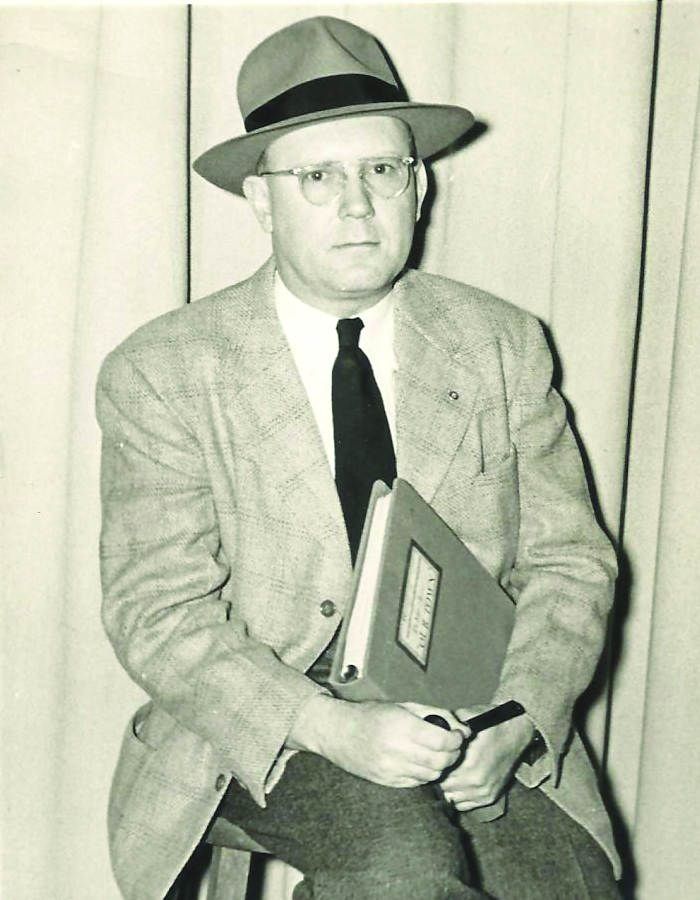

Marius Blesi
Marius Blesi was a member of the Emory & Henry faculty from 1947 to 1973. He taught at Syracuse University, the University of Louisville and Marshall College before coming to Emory & Henry. While at E&H, he served at times as chair of the English Department and chair of the Humanities Division. He was awarded the Henry Carter Stuart Chair of English.
He was a graduate of Harvard University, where he earned bachelor and master of arts degrees. He later earned a Ph.D. from the University of Virginia. His doctoral thesis focused on the actress and playwright Anna Cora Mowatt, who wrote the play, “Fashion,” which was the first play he directed at Emory & Henry.
Blesi was tasked with play production at Emory & Henry, along with his regular English classes, until the hiring of Alan Pickrell as the full-time drama professor. During Blesi’s time as director, the college presented productions of Shakespeare, Moliere, Oscar Wilde and Thornton Wilder, among others. Students participated in plays including “A Midsummer Night’s Dream,” “The Importance of Being Earnest,” “The Skin of Our Teeth” and “The Man Who Came to Dinner” (in which Blesi took the role of Sheridan Whiteside). The students who participated in the plays in the early years referred to themselves as the Mighty Blesi Art Players. His wife, Lucille, served as the makeup artist.
The production for which Blesi is most remembered is Thorton Wilder’s “Our Town.” The E&H production of the play was not only performed on campus, but also at Barter Theatre in collaboration with the theater. For all the productions of the play, Blesi invited E&H faculty members to take the mature roles, thus offering opportunities for students and their professors to work together in an artistic environment.
During his years as the play director, Blesi, along with Lucille, served as sponsors of Alpha Psi Omega, the drama fraternity. For many of the club meetings faculty and administration members were invited to attend and participate in the improvisational skits. One memorable time Dr. Earl Hunt, the president of the college at the time, portrayed a well-known student on campus; his impersonation was so spot on that everyone there that night was brought to tears of laughter.
Emily Blesi Anderson recalls, “My dad was first and foremost a classroom teacher who brought his excellent educational background to memorable classes in Chaucer, Shakespeare and others. As an English teacher he was unparalleled in bringing those classes to life. Many of his former students have told me that it was due to him that they too became English teachers.
“My dad loved all the arts. From the time he was first exposed to classical music in his late teens until a few years before his death, he amassed a huge classical record collection.
“After coming to E&H, my dad brought world famous writers to the campus, these included Carl Sandburg and May Sarton. The artist Grant Reynard came to campus several times to give art lectures; Mr. Reynard became a personal friend to our family and always stayed at our house when he came here.
“Reynard was a nationally recognized artist who was at one time president of the American Watercolor Society. He would come to Emory from his home in Massachusetts and stay at our house. He became a dear friend, and he loved to paint scenes particularly from the view looking out from the cemetery. My personal favorite is an oil painting of the view toward Whitetop because one can see at the bottom of the hill the original Denton’s store, Addison’s (Macado’s), and Dr. Hillman’s house behind it. Since two of those buildings are now gone, it is a lovely rendering of the past.
“I was thinking about a recent conversation that I had with my friend Pravda about our parents. My parents and the Sikorskis would feed and house visiting artists as a matter of course, rather than have the college put those people up. They enjoyed the friendships that grew from these distinguished visitors, but also they knew that they were saving the college some money.”